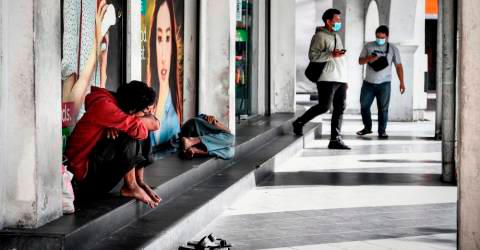PETALING JAYA: Spending money to house homeless people with mental illness has proven to be a strategy that helps governments save money.
Sounds like a contradiction but a study by the Arizona State University’s Morrison Institute of Public Policy has revealed that it is cheaper to provide them with housing equipped with the necessary behavioural and medical support than to have them cycle through emergency rooms, prisons and homeless shelters.
The study estimated that the healthcare cost per head could drop by up to US$20,000 if proper housing is provided for this group of underprivileged people.
While conditions in Malaysia are different, given that the homeless shelter programme is not as extensive, a similar initiative can help to curb societal problems linked to rising crime rates, death rates and other health issues, Dr Juita Mohamad, a fellow at the economics, trade and regional integration division at the Institute of Strategic and International Studies told theSun.
“The main issue in Malaysia is funding for such a programme,” she said. “It is for the government to come up with a plan to help this community that has fallen off the grid and through the cracks.”
Juita pointed out that society must first realise that mental health is just as important as physical health so that the necessary resources may be mobilised by all stakeholders.
“Partners from the private sector can also help in terms of funding different programmes to provide access to housing for the homeless,” she added.
Penang Institute chief operating officer Ong Siou Woon told theSun the initiative, if implemented in Malaysia, has to be tweaked to suit local conditions.
“Undoubtedly it is a good idea, but conditions here are different,” she said.
In Malaysia, she said, such facilities are centralised and sited at selected central locations. Given that local governments are not paying to maintain such facilities, there is no direct savings for them, she added.
“Facilities such as homeless shelters, as it is for prisons and mental health institutions, are very costly to maintain,” she pointed.
Ong said another issue that needs to be addressed is the lack of mental health experts and facilities in the country.
“Perhaps a better idea is to just transform existing homeless shelters by equipping them with the necessary medical health support than to build new facilities like those in the United States,” she said.
She pointed out that in Malaysia, designing housing schemes with a wellness and aged care facility nearby is already a growing trend.
“The US and Malaysia also differ in their family support structure culture. In the US, staying together with extended families is rare while in Malaysia, you are expected to do so,” she said.
Hence, sending family members with physical or mental illness to a home is rarely the first option for Malaysian families, she added.
Relate Mental Health Malaysia founder and clinical psychologist Dr Chua Sook Ning said the US model is based on a World Health Organisation estimate that it is more cost effective to invest in mental health treatment than to allow mental illness to go untreated.
She added that this is a good potential intervention to look into but more research is needed to examine the feasibility and effectiveness of these housing sites to ensure that people are getting the support that they need for recovery.
“We need to involve people who have lived with such experiences in the decision-making process so that we know the issues they face and what solutions work best for them,” Chua added.










